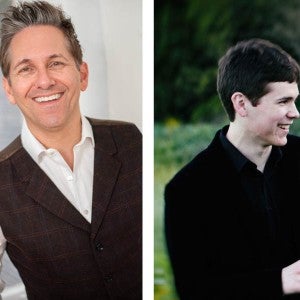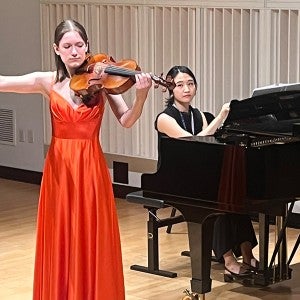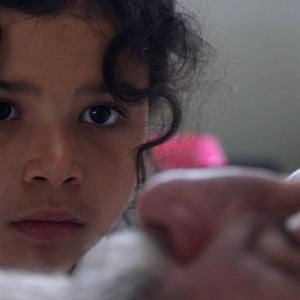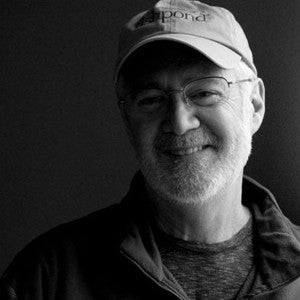School of Pop: Interlochen’s Popular Music Performance major offers opportunities to learn, perform, and collaborate
Once an extracurricular ensemble, the fast-growing program celebrates the talents of contemporary musicians past, present, and future through cover concerts, multidisciplinary projects, and recording experiences.
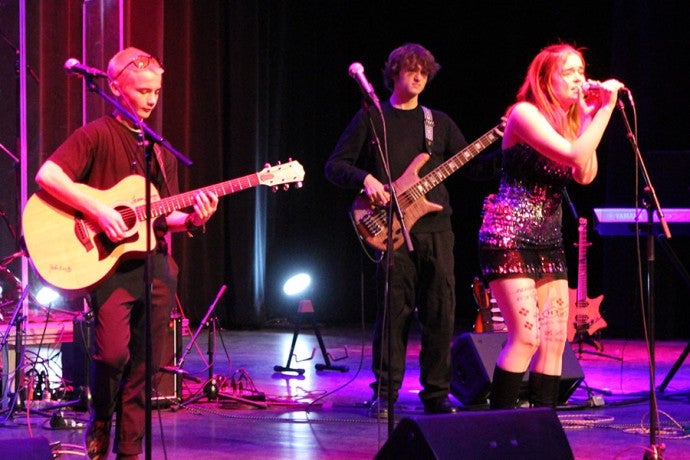
Popular Music Performance students perform during the recent Arena Rock! concert.
On Oct. 19, 2022, dozens of Arts Academy students gathered for a performance in Corson Auditorium. While the concert was billed as an evening of classics, it wasn’t Beethoven or Mozart on the program. Instead, the student performers played hits by rock icons including Janet Jackson, Van Halen, Prince, and Led Zeppelin.
A decade ago, a performance of arena rock favorites would have been an informal, student-led event. In the past several years, however, contemporary cover concerts have become key components of the Academy’s rapidly growing Popular Music Performance program.
Grooving and growing
The Popular Music Performance major’s roots stretch back more than five years to the founding of the Popular Music Ensemble (originally known as the House Band), which was established by the Academy’s previous instructor of guitar as an outlet for classical guitar students to gain experience in contemporary genres.
As interest in the Popular Music Ensemble grew, Associate Director of Contemporary Music and Collaborative Projects Courtney Kaiser-Sandler and her colleagues in the Music Division began actively recruiting students with interests in popular music.
“We started enrolling students with talents in multiple genres and instruments, such as upright bassists who could also play electric bass,” Kaiser-Sandler said. “Over the past two or three years, we’ve added more drummers and bass players, as well as pop vocalists. It has definitely boomed.”
Slowly, the extracurricular ensemble evolved into a separate program. Kaiser-Sandler says that the Popular Music Performance major complements the Academy’s other music offerings, creating a more comprehensive experience for students interested in contemporary genres.
“We’re beginning to have more four-year students,” Kaiser-Sandler said. “Because students are spending more time at Interlochen, we can give them more opportunities to discover the different facets of their musicality and explore their interests. A lot of Popular Music Performance majors switch to the Singer-Songwriter or Music Production & Engineering programs after a few years.”
Learning from the greats
The Popular Music Performance curriculum builds and refines musicianship skills through hands-on learning experiences. Its two core classes—Performance Lab and Popular Music Ensemble—teach valuable performance skills and introduce students to diverse subgenres by providing opportunities for students to rehearse and perform covers of hit songs by some of the most celebrated musicians in the contemporary music canon.
Less experienced students are placed in Performance Lab, in which they are assigned an instrument—either their primary instrument or one they’ve never played, depending on the student’s goals and ensemble needs—and placed in bands. Students in Performance Lab do not present public performances, allowing them to focus on honing their techniques, mastering new instruments, and learning best practices for rehearsal.
More advanced students join the Popular Music Ensemble, which serves as the primary vessel of the Popular Music Performance curriculum. The ensemble is led by Instructor of Guitar Matthew Cochran with additional instructional support from Instructor of Voice Jennifer Cresswell and Instructor of Singer-Songwriter Joshua Davis.
Each semester, the Popular Music Ensemble presents one formal concert centered on an overarching theme. “The Popular Music Ensemble studies different styles each semester—such as Motwon, Philly Soul, or Alternative Heroes of the Underground—teaching students the history and social relevance that surrounds that genre,” Kaiser-Sandler said. “As students grasp the historical context of these popular music styles, they explore how the music is crafted through song form, chord choices, and lyrical content. They also learn performance techniques, how to create lead sheets, and how to find the best key for their voice.”
Popular Music Ensemble members enjoy many other opportunities to perform, both on campus and in the surrounding community. The ensemble backs senior recitals and is a staple at many of the Academy’s student life events, such as the annual Halloween dance, Open Mic nights, and the opening evening of Festival, the Academy’s multiple-day, end-of-the-year showcase which features performances by students from all artistic disciplines. Beyond Interlochen’s campus, the ensemble frequently performs at local functions and philanthropic events; members of the Popular Music Ensemble will also join singer-songwriter students at Traverse City’s City Opera House in February.
In addition to Popular Music Ensemble or Performance Lab, Popular Music Performance students take music theory classes, Music Business, Music Archeology, and private lessons in their primary instrument or voice. Students are strongly encouraged to take Songwriting Foundations and Jazz Improvisation and to explore other ensembles such as the Arts Academy Choir and Jazz Orchestra.
Collaborating on the stage and in the studio
Collaboration is an integral part of the Popular Music Program curriculum: Beyond rehearsing and performing with their bandmates, popular music students frequently collaborate with peers in both other music majors and the Academy’s other six artistic disciplines. The Popular Music Performance program maintains particularly close partnerships with the Singer-Songwriter and Music Production & Engineering majors.
“When a singer-songwriter has a song that they have arranged for a typical band format, they’ll meet with the ensemble to discuss the arrangement, then Matt [Cochran] chooses which students will participate in the collaboration,” Kaiser-Sandler said. “Because our students are hungry to record and perform, many of them get involved with recording EP projects and put together their own shows with faculty support.”
The majority of in-studio opportunities are the result of collaborations with Music Production & Engineering students. “Our Music Production students are both musicians and producers,” Kaiser-Sandler said. “Part of their curriculum is to understand how best to mic real instruments, as well as how to pull great performances from musicians. Music Production students work with Marc Lacuesta to choose students from the Popular Music program who are ready to learn how to be a professional studio musician. So much preparation goes into being ready to record—Understanding the song, knowing the part, playing a click track, and blending your voice are all skills that students learn in this setting.”
Outside of the music division, popular performance students are often invited to play for events in other artistic disciplines, such as visual arts gallery openings. Popular music students also participate in school-wide collaborations; several are currently collaborating with peers from the Singer-Songwriter, Jazz, and Music Production & Engineering programs to create material for the multidisciplinary showcase मुक्ति : MUKTI, which will premiere at David Geffen Hall in New York City on March 3, 2023.
Finding validation
For Kaiser-Sandler, leading the Contemporary Music Division at Interlochen is more an opportunity to inspire the next generation of young musicians—it’s also an opportunity to bring recognition to the talents of musicians working in popular styles.
“Today, popular music styles are the background of everyone’s lives: it’s on the radio, on television and film, and in commercials,” she said. “We sometimes forget that the people who create and perform popular music styles are masters at what they do—master writers, master performers, and master collaborators. We need to have programs like Popular Music Performance at schools like Interlochen because it validates that popular musicians are just as knowledgeable as classical musicians—they just practice a different form of musical communication that is more accessible to all.”
Kaiser-Sandler’s passion for working with developing musicians stems from the lack of opportunities to study popular music during her own musical training. “I studied classical voice, but the style wasn’t my passion,” she said. “There weren’t programs like this when I was in high school, so I learned all of these skills through touring and collaborating with other musicians. It’s a true privilege to be a mentor to our students and give them the education I wish had been available to me.”
“Programs like the Popular Music Performance major—and our other offerings in contemporary music—help show the world what the future of music education should be.”
